Common Dog Behavior Problems
Barking, Howling or Whining

In one form or another, dogs will communicate vocally. Sometimes, a little too much. If you are dealing with excessive barking, howling or whining, then you need to learn what triggers this behavior.
Some common reasons for excessive vocalizing are excitement, playfulness, anxiety, alert, boredom or responding to other dogs. Once you figure out the cause, then you can start to work on training that will help with the behavior.
Digging
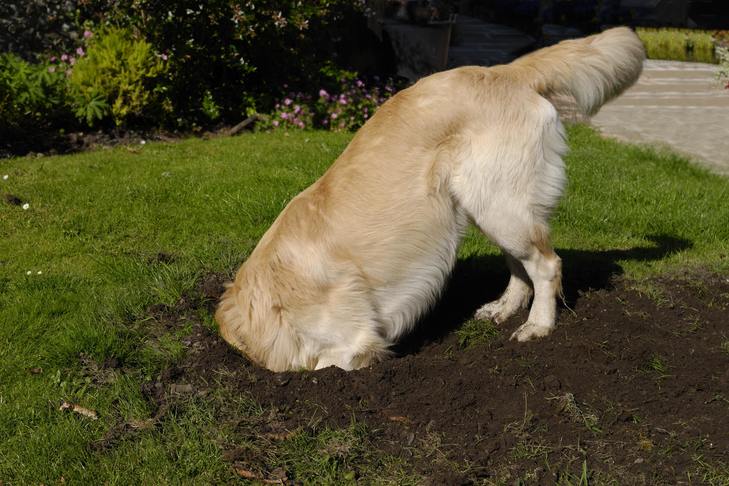
Some dogs just LOVE to dig. For many dogs, this behavior is instinctual. In some cases this behavior was augmented by people for hunting purposes. This behavior can be really annoying especially if your gardens, lawn or even your carpet are being destroyed. Most times dogs dig when they are seeking attention or playing.
Some things you can try to improve this behavior are walking your dog regularly, spend time playing with active toys like balls and frisbees, teach your dog some tricks and commands, or enroll them in a training class to stay active and keep learning.
Chewing
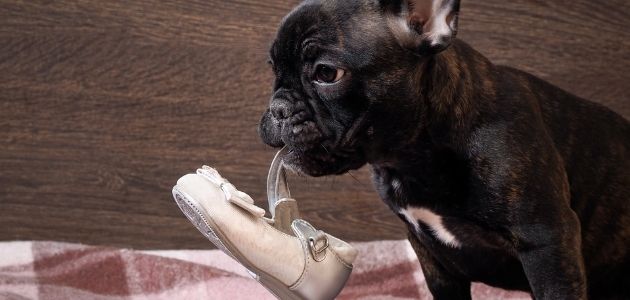
If you’re a dog owner, you’ve probably come home to something in the house that has been chewed up. For us, it was the corners of two of our chairs. That was expensive. Maybe for you it’s a pair of shoes or even the corner of a wall in your house.
Whatever it is, it’s super frustrating. Chewing is a natural thing for dogs. They use their mouths like we use our hands to explore and experience things. Dogs chew for lots of reasons. They could be teething, maybe their bored, or they may be stressed out. Regardless of the reason, you need to give them alternatives to your shoes or furniture.
Try some chew toys or some tug toys as alternatives. If they are set on shoes or furniture you could also try a repellent spray that makes it unpleasant to chew on the things you don’t want destroyed.
Improper Urinating or Defecating

If your dog has been house trained and all of a sudden begins making messes in your house you need to rule out any medical issues. Sometimes urinary tract infections, kidney stones, or arthritis. Be sure to talk to your vet.
If it’s not a medical issue, it could be a setback in house training caused by a change of schedule, it could anxiety brought on by a number of things like a change in the home or even a thunderstorm, or if your dog is not neutered they could be marking territory.
Whether it’s medical or behavioral, it’s a good idea to contact your vet to help find a solution.
Chasing
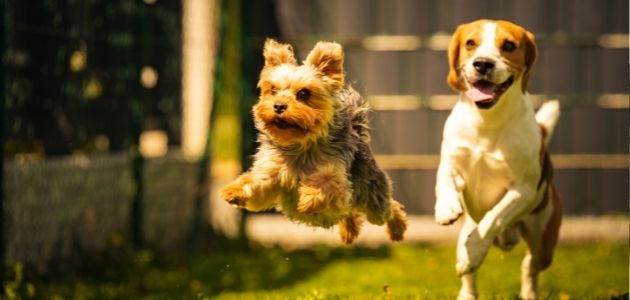
Chasing is another very natural instinct for dogs. It’s also one of the most frustrating and potentially dangerous behaviors for your dog.
Some dog breeds are more prone to be chasers. They have been bred for thousands of years to chase down prey. However, it is possible to train your dog to ignore the triggers for chasing.
Using treats, leash training, toys and games can channel your dog’s chasing instincts into acceptable behaviors.
Begging

Those sad little eyes looking up at you. That cuteness is so hard to ignore. There are a couple things to consider. Is your dog eating a balanced and nutritious diet. If they are missing something in their meals this may be the cause of the begging.
Check with your vet to be sure your dog’s diet is adequate. It could also be your dog trying to get attention. Be sure to have structured play time with your dog and get them plenty of exercise.
Jumping

Usually the reason dogs jump is to greet people. Dogs like to meet face to face like they do with other dogs. Unfortunately, many people do not appreciate this type of greeting. In fact, it can be dangerous for young kids.
If you are punishing the dog each time someone enters your home, your dog may become even more aggressive as they see a guest as a very negative or threatening thing.
Try keeping treats by the front door and work on rewarding proper behavior.
Biting or Mouthing
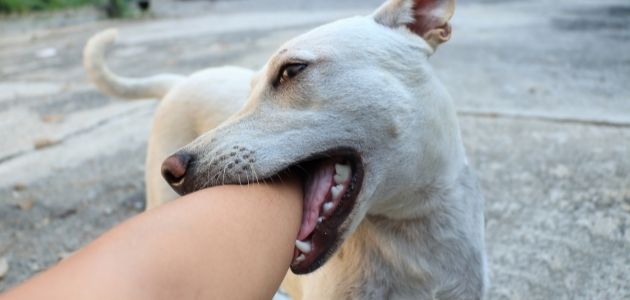
Mouthing is a normal behavior for dogs. However, for adult dogs, this can become a very difficult problem to control. It could be a sign of aggression issues if it’s being done out of fear of frustration. We come to expect this with puppies.
As we have said this is how they learn and experience things like we do without hands. Recognizing the difference between play mouthing and aggressive behavior is important.
Most times when a dog is playing they will be relaxed in both their face and body. If the mouthing is aggressive, you’ll see a lot of tension in the facial muscles and their body will be stiff.
To deter mouthing behavior try teaching your dog to be gentle. Don’t be rough when playing and don’t wave your hands or fingers in your dogs face to excite them to play. If your dog is still having problems seek the help of a professional trainer.
Aggression
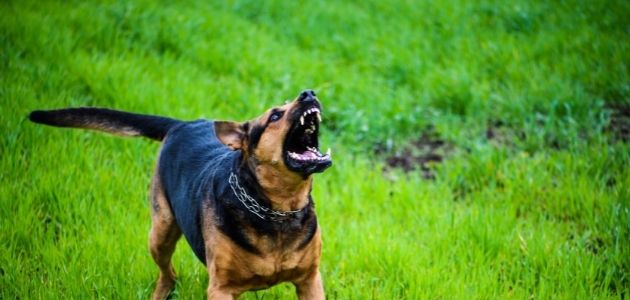
There are many different reasons for dogs to become aggressive. They could be guarding their territory, a family member or their food. It could be from frustration, fear, or pain. It could be a drive for prey.
All of these causes can turn a dog from relaxed to aggressive quite quickly. If you feel like your dog has an issue with aggression it’s best to seek professional help from a trainer. Talk to your veterinarian to get a recommendation.
Separation Anxiety
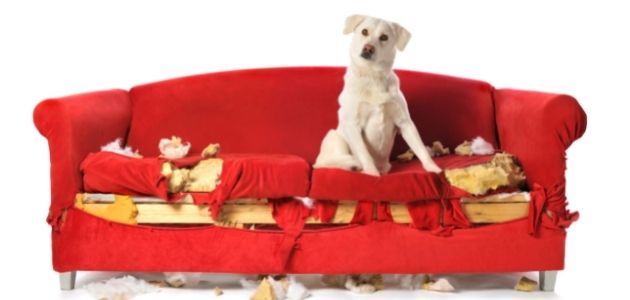
For some dog parents, leaving their dog alone can be an adventure. They never know what their going to get when they get home. If your dog is chewing, barking, destroying, urinating or pooping while you’re away, they are likely have separation anxiety.
We don’t know exactly why some dogs develop separation anxiety but, because it’s more prevalent in adopting dogs, it may be from losing a person or moving to a new environment. It could also come from a schedule change.
Be sure to rule out any medications or medical issues that can cause incontinence. If you think separation anxiety might be an issue, check out our article, 9 Natural Remedies for Your Dog’s Anxiety.
Any and all of these behaviors can put a lot of stress on you and your family. If you feel overwhelmed, be sure to seek out professional help.
Talk to your veterinarian as they will be the best resource in your community.


The article provides a useful guide for dog owners dealing with common behavior problems in their pets, such as barking, jumping, and destructive chewing. The article offers practical advice and strategies for addressing these issues, such as using positive reinforcement, establishing clear boundaries, and seeking professional help if needed.
The article emphasizes the importance of understanding the root causes of a dog’s behavior problems, such as boredom, anxiety, or lack of training, and addressing these underlying issues through appropriate behavior modification techniques. The article also highlights the importance of consistent training and reinforcement, as well as the potential benefits of seeking professional help from a dog trainer or behaviorist.
One area where the article could be improved is by providing more specific guidance and examples of behavior modification techniques for each of the 10 behavior problems, as well as information on how long it may take to see results. Additionally, it would be helpful to include information on how to prevent behavior problems from developing in the first place, such as through early socialization and consistent training.
Overall, the article is a helpful resource for dog owners dealing with behavior problems in their pets, and provides practical and compassionate solutions for addressing these issues and improving the well-being of both the dog and the owner.
Reading this blog brought back memories of my old golden retriever, Max, who had a penchant for digging up my garden every time he was left unsupervised. The in-depth analysis of why dogs behave the way they do offers solace to many frustrated dog owners, reminding us that there’s always a reason behind their antics. It’s heartening to see an article that not only identifies the problems but also guides on understanding and compassionately addressing them.